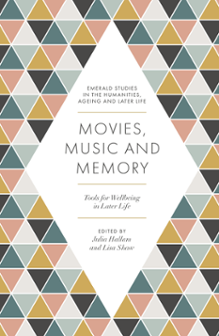Movies, Music and Memory

Tools for Wellbeing in Later Life
Synopsis
Table of contents
(10 chapters)Abstract
This chapter explores three different Cinema, Memory and Wellbeing pilot projects, two of which were carried out in Liverpool and the other in Petrópolis, a city of comparable size in the state of Rio de Janeiro, Brazil. It begins by discussing our motivations for developing these projects and how we drew on our previous research relating to films and cinema-going. It then presents the three different projects, showing how each was tailored to the care context in question (a residential nursing home and a day-care centre on Merseyside, and a GP practice in Brazil), explaining how they were conducted and discussing the results, with a view to informing and improving future initiatives of this type. We also show how our findings have shaped the creation of the ‘best-practice’ toolkit designed to enable activities coordinators, carers and health professionals to optimize the benefits of using films to stimulate memories and reminiscence and promote an improved sense of wellbeing among older people and those living with dementia. (This toolkit is available to download from the Emerald website in English: https://books.emeraldinsight.com/page/detail/Selfies/?K=9781787437173). We recount in detail our practical experiences of setting up and running screenings in diverse environments, how we set about trying to ‘measure’ or at least gather some tangible evidence of the wellbeing benefits of these events, and provide numerous examples of the reminiscences that they generated, as well as the feedback on the projects that we received from both the people who participated and the people who care for them.
Abstract
Working at the University of Liverpool alongside Julia Hallam and Lisa Shaw, and in the Department of Music, are Sara Cohen and Jacqueline Waldock. Both Sara and Jacky have led projects that engage with and support local organizations and communities, and examine music from the perspective of those involved. In fact, it was their shared interest in how ‘ordinary’ people engage with and experience music in everyday life that prompted them to join forces in 2014, and start working together on community engagement projects. At the same time, they have brought to these projects their own individual research interests and expertise. In this chapter, we discuss their recent collaboration on a project that explores the use of music to improve the wellbeing of older people in the UK, including people living with a dementia-related cognitive impairment and in nursing homes and health-care settings, and those who live independently but are cared for at day-care centres run by voluntary and community-based organizations. We situate this project within a selection of UK music initiatives or ‘interventions’ aimed at helping those living with dementia and age-related memory loss, and outline how specific projects informed our own approach and work.
Abstract
This chapter will begin by exploring the importance for people living with dementia of maintaining a sense of self or ‘personhood’, and how this is linked directly to wellbeing. It will chart how the initial pilot projects were developed to embrace older people living with a dementia diagnosis, and how we teamed up with different partners in Brazil and on Merseyside, showing how the methodology outlined in the toolkit can be used to foster this sense of self or ‘personhood’. In both geographical locations it proved vital to establish contacts with enthusiastic partners and to work closely with occupational therapists and/or nursing home staff. On Merseyside we also benefitted from the expertise of a local community cinema which had extensive experience of running dementia-friendly film screenings. Finally, drawing on concrete results from the use of the toolkit's methodology in a recent project that Lisa conducted in Brazil, this chapter will present some conclusions about how music and film can help carers connect with the person living with dementia, and be used as a powerful tool for restoring a sense of personhood, thus increasing a sense of wellbeing and improving the quality of care.

- DOI
- 10.1108/9781839091995
- Publication date
- 2020-04-15
- Book series
- Emerald Studies in the Humanities, Ageing and Later Life
- Editors
- Series copyright holder
- Emerald
- ISBN
- 978-1-83909-202-2
- eISBN
- 978-1-83909-199-5